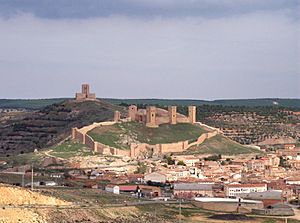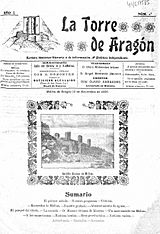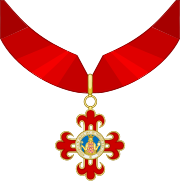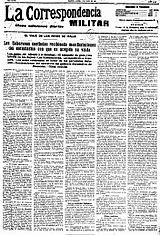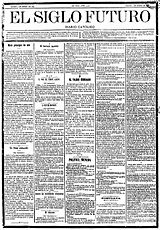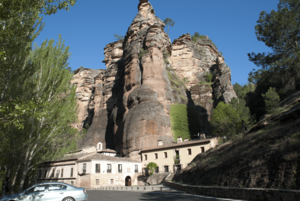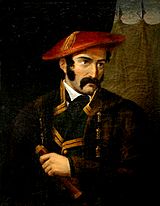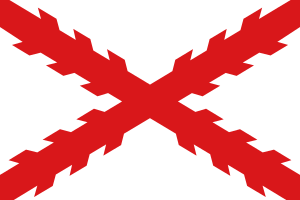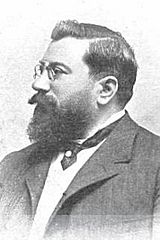Claro Abánades López facts for kids
Quick facts for kids
Claro Abánades López
|
|
|---|---|
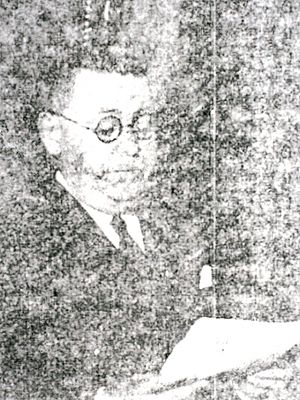 |
|
| Born |
Claro Abánades López
12 August 1879 Molina de Aragón, Spain
|
| Died | 16 December 1973 (aged 94) Madrid, Spain
|
| Occupation | publisher |
| Known for | journalist |
| Political party | Comunión Tradicionalista |
Claro Abánades López (born August 12, 1879 – died December 16, 1973) was a Spanish journalist, publisher, and historian. He was also an activist for a political group called the Carlists. He worked as a journalist for over 70 years, from 1897 to 1969. He is best known for his historical studies about the Alcarria region and for editing many books of a writer named Juan Vázquez de Mella.
Early Life and Education
Claro Abánades López grew up in a working-class family. His family came from a region in Spain called Alcarria. His father, Pedro Abánades Jiménez, built things for a living. Claro was the second of five children. His family was very religious.
He first went to a primary school in his hometown, Molina de Aragón. It was run by nuns called the Poor Clares. Later, he attended a good secondary school, where he earned his bachelor's degree.
Claro wanted to study law in Madrid. However, his family did not have enough money for him to attend regular classes. So, in 1899, he enrolled as a part-time student at the University of Madrid. He later studied philosophy and history, earning a diploma in history in 1906. After that, he became a Doctor in both subjects. This allowed him to teach in schools.
Claro Abánades married Natalia Arpa. They first lived in Molina de Aragón. In 1907, they moved to Madrid. Claro worked as a professor at a well-known school called Colegio de la Concepción. Later, in the 1930s, he became the headmaster of another Madrid school, Colegio San Ildefonso. This school offered a full Catholic education. Claro and Natalia had three children: Claro Pedro, Mariano, and María de los Angeles. His oldest son became a journalist, and his younger son became a professor.
Journalism Career
Claro Abánades started his journalism career in 1897. He wrote for many different newspapers in the provinces. He wrote about history, politics, literature, and local customs. He also sent news from different parts of the province.
In 1906, he helped start a small newspaper called La Torre de Aragón. It focused on social issues from a Catholic viewpoint. In 1908, he started his own weekly newspaper, El Vigia de la Torre. This paper was more outspoken and claimed to be the only truly Catholic newspaper in the province. Some people said it had Carlist leanings.
From 1910 to 1914, Abánades tried to start a Carlist youth newspaper in Madrid three times. He joined a national newspaper called El Correo Español in 1914. This was the official newspaper for the Carlists. He became part of its editorial team. In 1919, he left El Correo and became the editor-in-chief of El Pensamiento Español. This newspaper was for a new group of Carlists. He managed it until it closed in 1923.
During the dictatorship in Spain, Abánades wrote for many newspapers. These included national papers like El Día and La Nación. He also wrote for local papers like La Constancia and El Castellano. He also wrote for weekly magazines. During the time of the Spanish Republic, he mainly wrote for El Siglo Futuro. He also published in other Catholic newspapers across Spain.
After the Civil War, Abánades worked for a news agency he had been part of before the war. He also briefly managed a newspaper called "Lúmen" and wrote for other papers, especially El Alcázar. In the 1940s, he was considered one of the most experienced journalists in Spain. In 1947, he received the Order of Alfonso X the Wise for his long career. He was also named an "Honorary Journalist" by the Madrid Press Association. His last known newspaper article was published in 1969.
Journalist's Style
Abánades was the head of a major newspaper only when he managed El Pensamiento Español from 1919 to 1923. He was also on the editorial boards of El Correo Español and El Siglo Futuro. For other newspapers, he usually wrote as a correspondent.
While he wrote about many topics when he was young, he later focused on three main areas. He wrote articles about the history of Spain, especially Castile. He also wrote about the history and ideas of Traditionalism, often praising Juan Vázquez de Mella. However, he became most famous for his comments on international news.
His articles, usually about 500 words long, explained major world events. He aimed to help readers understand the reasons behind these events and what they meant. For example, he predicted in 1923 that France would be isolated after World War I. In 1932, he said that European security systems were unstable. Many of his comments were accurate.
Abánades had a conservative view of Europe in the 1930s. He believed the Treaty of Versailles caused many problems after World War I. He admired some political movements in Germany and Italy. He showed respect for Benito Mussolini, the leader of Italy, and wrote about Italy's expansion.
Author and Playwright
Besides being a journalist, Abánades was also a writer. He published several books and booklets. Some he wrote himself, some he co-wrote, and some he edited for others. His writings mainly covered three areas: plays, history, and Carlism.
His most important original works are historical books about the Alcarria region. He wrote a huge 6-volume study called El Señorío de Molina. Estudio histórico geográfico, but it was never fully published. Shorter versions of this work were published later. He also wrote La Reina del Señorío (1929), which was about the Virgen de la Hoz sanctuary. Other historical works included El alcazar de Molina (1963). He also wrote about the history of Madrid's schools. Because of his work, Molina de Aragón named him its Official Chronicler and Favorite Son.
Abánades also contributed a lot to Carlist literature. He famously edited a huge 31-volume collection of all the works by Vazquez de Mella. He also wrote his own summary of Mella's ideas. His historical books about Carlism included Carlos V de España (1935) and Carlos VII, Duque de Madrid (1936). He also wrote political pamphlets like El peligro de España (1914).
Finally, Abánades also wrote for the theater. In the early 1900s, he wrote a play called La mano de una madre. He was also an amateur actor in Madrid and even started his own theater group called “Nosotros” in the 1930s. He also gave public talks about Molina's history and Carlist ideas.
Carlist Activism
Carlism was a political movement in Spain that supported a different branch of the royal family. Claro Abánades was an active Carlist. In 1896, he became the president of a Catholic youth group in Molina. He also helped start a Catholic social fund. His work made his home region, Señorio de Molina, a very active Carlist area. He also helped organize Carlist events in other provinces.
In 1911, Abánades met Juan Vazquez de Mella, a very important Carlist leader. This meeting greatly influenced Abánades' political views. Abánades became a follower of de Mella. During World War I, the official Carlist leader supported neutrality. However, Abánades and de Mella published a book in 1915 that supported Germany. De Mella invited Abánades to work for El Correo Español, the official Carlist newspaper. In 1919, Abánades followed de Mella when he left the main Carlist party.
From 1919 to 1923, Abánades' political career was at its peak. He managed the newspaper for de Mella's new party, El Pensamiento Español. He promoted de Mella's ideas, which included opposing the existing government and wanting a new Traditionalist system. However, de Mella's movement did not become very strong, and El Pensamiento Español closed.
Unlike many of de Mella's followers, Abánades remained loyal to him even after de Mella left politics. This meant Abánades was somewhat isolated during the dictatorship of Primo de Rivera. In 1931–1932, he rejoined the main Carlist organization, Comunión Tradicionalista. He did not hold major positions but focused on writing articles, books, and giving talks to spread Carlist ideas. He was elected to the Madrid educational board, which was seen as a victory for conservative groups.
It is not clear what Abánades did during the coup of July 1936 or the early years of Francoism. Some sources say he supported the new Francoist government, while others say he remained active in Carlist cultural groups. In the 1940s, he supported a different Carlist claimant, Karl Pius. At this time, he was also involved in religious projects, like the crowning of Virgen de la Hoz as the "Queen of Molina de Aragón."
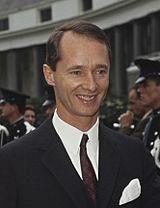
In the mid-1950s, a younger generation of Carlists, led by Prince Carlos Hugo, began to gain influence. Abánades became involved in this new struggle. In 1959, he was elected president of a Carlist cultural group. In the early 1960s, he was honored by Carlos Hugo and his group. He received awards and presided over events honoring de Mella. He published his last known article in a Carlist newspaper in 1969.
Images for kids
Error: no page names specified (help). In Spanish: Claro Abánades López para niños
In Spanish: Claro Abánades López para niños
- Carlism
- Alcarria
- Molina de Aragón
- Juan Vázquez de Mella
- El Siglo Futuro
- Virgen de la Hoz


